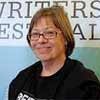Rosemary Sorensen

Rosemary Sorensen is a journalist, formerly books editor of the Brisbane Courier-Mail, and arts writer at The Australian. She is currently director of Bendigo Writers Festival.
In his Canberra 1913–1950 Jim Gibbney summarises the indecisions which accompanied the establishment of a site for Canberra around the turn of the century. When finally, in December 1908, Yass-Canberra was decreed the Seat of Government, it brought to a close nearly two decades of hesitation – at least Australia knew where the Federal Capital was to be situated, if not what kind of city i ... (read more)
You, certainly, understand what it’s like when you know for sure, and in your heart of hearts, that there is something rotten in the State of Denmark, but every time you put up your hand to point to the rottenness it is ignored, slapped down, or obfuscated. Lying, back-stabbing, shoving one’s own snout in the trough ahead of the mob, manoeuvring to get ahead, and destroying anything that might ... (read more)
For some time now literary criticism has been fascinated by the role of naming, and the inscription of the name, in relation to the identity of the self. There are rich pickings to be had from examining autobiography for the way the writer reveals and hides behind the words with which a life is described. And in this era of autobiographical and biographical tumescence, it is most important that th ... (read more)
I don’t know how all the jumping, throwing, sweating and grimacing went, but that opening ceremony for the Olympic Games in Barcelona was hallucinogenic. I’ve never seen so many men in leather-look congregating under lights! And wasn’t that rippling sea effect fantastic? Who’d imagine you could do so much with the new synthetics. How wonderful for the Barcelonians to have snaps for their f ... (read more)
A conversation about an anachronism led Rodney Hall to this new novel, Love without Hope. He acknowledges his wife as the person who informed him that until the 1980s there was a Department of Lunacy in New South Wales, with an asylum superintendent titled the Master of Lunacy.
... (read more)
When, the opening pages of The Butcher Boy, it becomes clear that the narrator is an uneducated toughie whose sorry history is going to be the subject of the book, the reader’s danger flags are likely to be unfurled. To sustain such a voice without losing credibility is a tricky task. But the first chapter establishes that voice with exceptional skill, and this success continues through almost t ... (read more)
What can we make of the fact that, of the forty-seven stories selected by Robert Drewe for this year’s The Best Australian Stories collection, thirty-three are written in the first person? The influence of Creative Writing classes has to figure in any stab at an answer. It would be interesting to do the rounds of the universities to discover whether the teachers of such courses actively encourag ... (read more)
People who have read John Banville’s Book of Evidence tend to pale and take on a manic look when they’re told that there is a new Banville out. When they learn that it’s linked with that earlier book, almost a sequel, their ears pinken, their lips tremble, and, most disturbingly, their fingers begin to twitch. At this stage, the holder of an advance proof backs away, calmly, as smoothly as p ... (read more)
The kind of writing that is to be found in Ania Walwicz’s collection Boat is the kind that angers many people. Eschewing punctuation as benevolent and therefore inferior signposts to meaning, Walwicz’s prose is uncompromisingly difficult. Plot is virtually absent. Syntax defies convention. The ugly, both visually and verbally, is preferred to the beautiful.
Her tradition is that of Dadaism an ... (read more)
